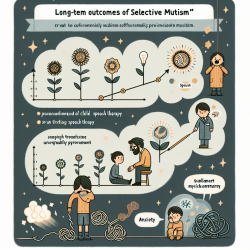Selective mutism (SM) is a childhood anxiety disorder characterized by a child's inability to speak in certain social situations despite speaking normally in others. Understanding the long-term outcomes of SM is crucial for practitioners aiming to improve therapeutic interventions and long-term care plans. The recent systematic literature review titled Long-term outcomes of selective mutism: a systematic literature review offers significant insights into the persistence of SM symptoms and associated psychiatric outcomes.
Key Findings
The systematic review examined 18 studies with a total of 292 subjects, providing a comprehensive overview of the long-term outcomes of SM. Here are the key findings:
- Recovery Rates: Approximately 78% of subjects showed moderate to total improvement in SM symptoms during follow-up periods ranging from 2 to 17 years.
- Associated Psychiatric Disorders: Anxiety disorders were the most common comorbid conditions, with prevalence rates ranging from 6% to 54.2% in various studies. Other psychiatric conditions such as depression and psychosis were also noted, although less frequently.
- Prognostic Factors: Older age at baseline, symptom severity, and familial psychopathology were associated with poorer outcomes. Conversely, group treatment methods showed better recovery rates.
Implications for Practitioners
Understanding these findings can help practitioners tailor their approaches to treating SM more effectively. Here are some practical steps based on the review's outcomes:
- Early Detection and Intervention: Early diagnosis and treatment are crucial. Delayed intervention can lead to persistent symptoms and the development of other psychiatric disorders.
- Comprehensive Treatment Plans: Incorporate a mix of psychosocial interventions, cognitive behavioral therapy (CBT), and possibly pharmacological treatments to address both SM and any comorbid conditions.
- Family Involvement: Engage family members in the treatment process, as familial psychopathology and dynamics significantly impact outcomes.
- Long-term Follow-up: Given that some individuals may experience persistent symptoms or develop other psychiatric conditions, long-term follow-up is essential for monitoring and supporting these individuals.
- Environment Considerations: Changing the child's environment, such as their school, may sometimes be necessary to alleviate symptoms.
Encouraging Further Research
While the review provides valuable insights, it also highlights the need for further research. Most studies had small sample sizes and lacked control groups, limiting the generalizability of the findings. Future research should focus on larger, methodologically robust studies to confirm these results and explore additional factors influencing long-term outcomes.
Practitioners are encouraged to stay updated with ongoing research and consider participating in or supporting studies that aim to fill these gaps. Collaborative efforts between clinicians and researchers can lead to more effective treatments and better long-term outcomes for children with SM.
To read the original research paper, please follow this link: Long-term outcomes of selective mutism: a systematic literature review.










